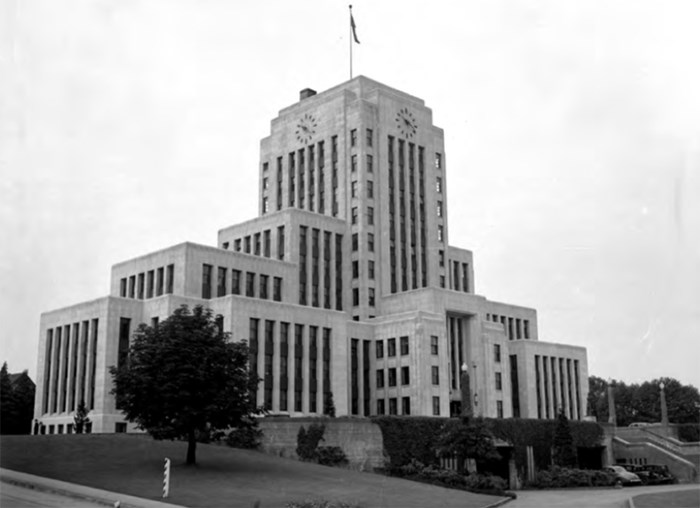For the first time in a decade, VancouverтАЩs municipal government will not be dominated by Vision Vancouver. After three victories for Gregor Robertson and his team, the party is running several candidates for council, school board and parks board, but has no contender for mayor in this monthтАЩs election.
There are plenty of reasons to be happy or upset with the actions of a municipal government. With this in mind, Research Co. recently asked Vancouverites about the performance of the current city hall on 10 different issues.
 Province Newspaper photo, ┬щ╢╣┤л├╜╙│╗нPublic Library/ VPL 40212.
Province Newspaper photo, ┬щ╢╣┤л├╜╙│╗нPublic Library/ VPL 40212.
There are four issues where Vision VancouverтАЩs outgoing government gets high marks from residents. Three-in-four Vancouverites (74 per cent) say the municipal administration did a тАЬvery good jobтАЭ or тАЬgood jobтАЭ in promoting tourism to the city.
In addition, two-thirds of residents (68 per cent) think city hall has dealt properly with the provision of sanitation services. Vision VancouverтАЩs decade in power did not bring with it work stoppages or service interruptions, like the ones experienced in 1997 and 2007. VisionтАЩs tenure also included a change in the way garbage is collected, and aside from a few early problems, the public appears to have adapted well.
Two other government competencies get a thumbs up from more than half of residents: fostering artistic and cultural activities (58 per cent) and protecting the environment (55 per cent). Environmental stewardship was always one of Vision VancouverтАЩs key policy planks. Its recent actions to minimize the cityтАЩs reliance on plastic have been very popular with residents.
But not everything that a government does, or can do, is seen positively. Satisfaction is lower with other aspects of VancouverтАЩs outgoing government, including dealing with crime (44 per cent), enhancing the overall quality of life of residents (32 per cent) and dealing with transportation (also 32 per cent).
VancouverтАЩs public safety numbers are nowhere near what is observed in neighbouring Surrey, but there is still a large proportion of the population that is concerned with the way things are going. Transportation is a complex challenge that entails several levels of government and different types of commitment. It is not surprising to see many residents expressing doubts.
Three other issues are ranked significantly lower. Only 24 per cent of Vancouverites believe the city has done a good job in managing development and growth, and just 14 per cent are satisfied with its work to deal with homelessness and poverty. Finally, only 10 per cent of residents think city hall has done a good job in dealing with housing.
On development and growth, certain groups are more critical than others. Residents aged 18 to 34 are more satisfied (37 per cent) than those aged 35 to 54 (22 per cent) and those aged 55 and over (13 per cent).
A pledge to end homelessness in the city was one of Vision VancouverтАЩs most sensational proposals. The task proved impossible, and most residents are critical about what has been accomplished тАУ especially those aged 35 to 54.
On housing, the numbers are staggeringly low. Just one-in-10 Vancouverites is satisfied with the way the city has handled this issue, yet two-thirds (67 per cent) believe housing is the most important issue now facing the city.
While the outgoing government can take solace in its high ratings for tourism, sanitation, culture and environmental protection, the survey points to a change in demographics that deeply affected the governing partyтАЩs ability to communicate its policies and retain its voter base. In no group is this more evident than in generation X.
VancouverтАЩs numbers are particularly low on managing development and growth when compared with other municipalities. Residents aged 35 to 54 are more skeptical of the governmentтАЩs performance, partly due to the way the relationship between city hall and developers evolved over the past few years. Generation Xers are also deeply upset with the current situation related to homelessness and poverty, as well as housing.
The governing partyтАЩs disapproval on key issues can be tied to shifting demographics. The young adult who wholeheartedly endorsed Vision ┬щ╢╣┤л├╜╙│╗нin 2008, 2011 and 2014 is now older. Suddenly, the bike lanes are not as inspiring and practical when a toddler needs daycare. Receiving brochure after brochure of new тАЬiconicтАЭ buildings does little to help a previously motivated supporter to get into the housing market.
The governing party needed to adapt its policies to the changing desires of a voter base that expected different things as it got older. Dealing with these expectations will be crucial for the incoming mayor and council.


